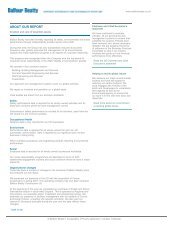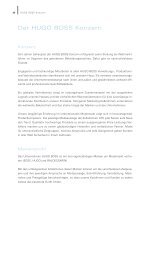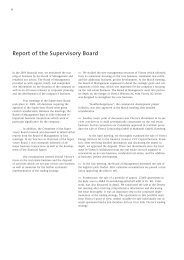E_mg_GB_03_vorne-29_3_04
E_mg_GB_03_vorne-29_3_04
E_mg_GB_03_vorne-29_3_04
Create successful ePaper yourself
Turn your PDF publications into a flip-book with our unique Google optimized e-Paper software.
62<br />
Industrial plant engineering covers the construction of complete plant in the field of power generation,<br />
oil and gas refining, and plastic and fiber production, as well as other large-scale environmentalengineering<br />
and chemical plant for various purposes. This business is generally characterized by large<br />
individual order volumes, an international orientation, long-term planning and project terms as<br />
well as complex contractual and financing arrangements. The risks involved in large-scale projects<br />
lie principally in the fact that the prevailing conditions and circumstances may deteriorate during<br />
the course of the project. At the same time, any failure to meet milestones and completion dates<br />
normally incurs contractual penalties, so that unforeseeable difficulties in completing a contract may<br />
impair its profitability.<br />
Furthermore, new technologies and processes are constantly being developed and implemented on an<br />
industrial scale. This so-called first-of-its-kind plant exposes the plant builder to the risk of extensive<br />
corrective work if industrial-scale process solutions prove more complex than expected. This entrepreneurial<br />
risk is mitigated by the selective acceptance of such contracts.<br />
<strong>mg</strong>’s industrial plant engineering business operates internationally. One focal point of its work is<br />
power-plant projects and industrial plant for oil and gas refining, which are often erected in emerging<br />
markets. In order to be able to identify potential risks in the handling of such projects at the earliestpossible<br />
stage, <strong>mg</strong> has set up a Risk Board, which checks contracts from a technical, legal and commercial<br />
viewpoint before they are accepted and arranges for any necessary adjustments to be made.<br />
<strong>mg</strong> implements forward-looking measures to mitigate risks arising from contracts in critical regions<br />
by using appropriate contractual arrangements, hedging instruments and ongoing project controlling.<br />
GEA’s business is characterized by lower contract volumes, shorter component-production runs, and<br />
the construction of smaller plant. Accordingly, GEA is less affected by risks from individual contracts.<br />
Its trading results are more subject to the prevailing procurement and sales situation in the relevant<br />
markets of its strategic business units. In December 20<strong>03</strong>, the Italian Parmalat Group, which is<br />
engaged, among other things, in milk processing, filed for bankruptcy. Despite the fact that GEA is<br />
a market leader in the field of milk processing, Parmalat’s bankruptcy has had no material adverse<br />
impact on GEA’s profits. This issue is expected to depress GEA’s sales only very slightly in the<br />
current year.<br />
Production in the chemicals business involves the commitment of substantially more capital than<br />
in engineering. Companies are particularly exposed to risks arising from the fact that capital investment<br />
is tied up in plant for long periods. <strong>mg</strong> mitigates the risk of misplaced investments with its<br />
sophisticated investment-controlling system. There is also a procurement risk attaching to the supply<br />
of raw materials and energy to industrial plant. Dynamit Nobel’s plastics business, for example, is<br />
particularly dependent on oil as the source of its raw materials. This risk is substantially reduced by<br />
the conclusion of long-term procurement and sales agreements. In the chemical industry – particularly<br />
where hazardous chemicals are used or produced – there is also a risk of possible accidents or environmental<br />
pollution. <strong>mg</strong> mitigates these risks by following the prescribed safety and organizational<br />
precautions.<br />
The chemical retailing and distribution activities engaged in by solvadis require extensive knowledge<br />
of the various procurement and sales markets. For this subgroup it is thus crucially important to recruit<br />
and retain suitable employees. The cost of capital is lower in chemical retailing and distribution than<br />
in production, so the barriers to market entry facing competitors are lower. This creates the risk that<br />
competition may intensify as a result of the entry or expansionist strategies of competitors.









